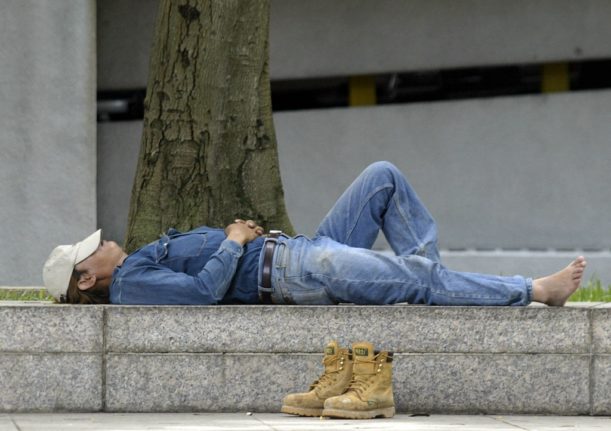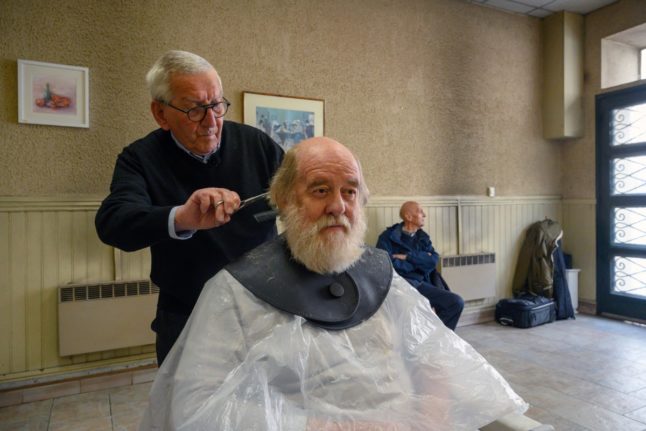It’s a persistent image of French workers, that they don’t actually do all that much work. At the more positive end of the stereotype, people will talk admiringly about the French ‘work to live, not live to work’ attitude, while the negative side of the stereotype assumes that everyone is lazy.
But there are plenty of people in France who do work hard.
Here’s a look at what the data says.
Workforce
A lot of international comparisons on work rate use the fairly crude metric of dividing the total number of hours worked by the population of a country – but there are several reasons why this disadvantages France.
This method counts the entire population, including people who are not in the workforce. For various reasons France has quite a lot of those.
Hear the team at The Local discuss the ‘lazy’ reputation of French workers in the latest episode of the Talking France podcast – download here or listen on the link below
Pensioners – in France people retire early (the current standard retirement age is 62 set to rise to 64) and then they tend to live a long time. These two things may, of course, be related.
The average life expectancy in France is 82, among the highest in Europe and a whopping five years longer than the USA (and two years longer than the UK).
This means that around a quarter of the total population of France are pensioners, and not therefore in the workforce.
Unemployment – France has a historically high rate of unemployment, especially youth unemployment.
It’s been falling steadily in recent years – and Emmanuel Macron’s government has set a target of full employment by 2027 – but at present around seven percent of the population are seeking work.
Young people – young people in France are likely to go to university – around 45 percent of the French population has completed higher education, so this also delays the age at which people get their first job.
A largely state-funded university education mean that students are less likely to get part-time jobs while they study, so many don’t begin work until the age of 21 or 22, once their studies are over.
A 2017 survey of 18-30 year-olds found that 11 percent did not get their first job until they were 24 or older and most people got their first job between the ages of 18 and 20.
Even data sets that use ‘working age population’ generally define this as people aged between 15 and 64, which doesn’t really fit French work patterns.
Working hours
So among those who are working – how much do they work?
The OECD has some good quality data that divides the total number of hours worked by the total number of people in employment.
On this metric, France comes out as pretty average for Europe – 1,490 hours a year per employee.
That works out at 5.7 hours per day, but doesn’t include holidays, and assumes that everyone in the workforce works full time.
France comes out roughly equal to the UK, slightly below the EU average but above Denmark, Germany, Luxembourg, the Netherlands, Norway, Iceland, Austria and Sweden.
It is significantly below Japan, the US and the world’s hardest workers – Mexico.
Strikes
International comparisons don’t include holidays or unexpected days off work, for strikes for example.
But it’s stretching things to say that French workers are ‘always’ on strike – strikes are heavily concentrated in the public sector, and even tend to focus on certain jobs – train drivers, teachers, air traffic controllers and sometimes civil servants.
Between 2011 and 2020 France saw an average of 89 days lost to strike action per 1,000 workers, with only between 1 and 3 percent of companies reporting any strike days at all.
Holidays
One thing that contributes to France’s reputation as a workers’ paradise/haven for the lazy is the strong protections that workers enjoy and the legal right to time off.
Workers in France get 25 days of annual leave and 11 public holidays per year. This puts France pretty much in line with European averages, but significantly ahead of workers in the USA, who benefit from very little statutory holiday time.
There are also other statutory leave periods such as maternity leave, which is 16 weeks.
These are the days off work you are entitled to in France
35-hour week
France’s most famous working time policy – the 35 hour week – also contributes to the impression of a relaxed working week, but it is not quite what it seems.
Yes, some employees – mostly those in the public sector – are entitled to only work 35 hours per week, but there are lots of groups who are exempt and therefore don’t benefit, including anyone working at middle-manager level or above and certain sectors (including journalism). And it only benefits salaried employees, not self-employed or freelance workers.
Those who do benefit from the 35-hour week generally work a 40-hour week and take the extra hours as time in lieu, known as RTT days. The average working week in France is 39.6 hours, which is about the European average.
Reader question: What time does the working day start and finish in France?
Public sector workers
Many of the stereotypes about French workers – both in France itself and abroad – come from public sector workers.
It’s true that many fonctionnaires do benefit from the 35-hour work and frequently strike – but public sector workers make up only around 20 percent of the workforce. That figure includes state employees such as police officers and members of the military, who are forbidden to strike.
Most of the rest of the workforce are employees in the private sector, but 11 percent are self-employed.
Fonctionnaires are often targets of satire or jokes in France about their ‘easy’ working life – which suggests most people don’t recognise these working patterns.
Productivity
It’s all very well being physically present in the workplace – but how hard are you actually working while you’re there?
Looking at productivity, France tends to score pretty well, consistently being ranked among the top 10 most productive countries in the world both by dollars per hour worked and by GDP per capita.
Despite its apparently ‘lazy’ workers, France remains the world’s seventh largest economy, which rather strongly hints that some people are doing some work.
And it’s worth pointing out that going on holiday is actually good for the economy – 10 percent of France’s GDP comes from tourism, the majority of that from domestic tourism.



 Please whitelist us to continue reading.
Please whitelist us to continue reading.
Member comments